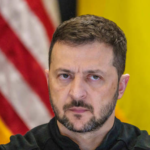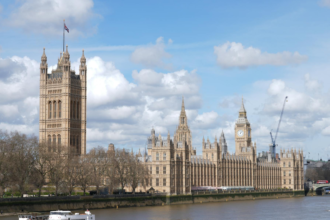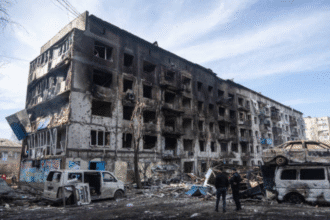Why did Macron reject the left-wing New Popular Front (NFP)?
Emerging with the most seats in last month’s legislative election, French President Emmanuel Macron has firmly rejected the left-wing New Popular Front (NFP) alliance as a potential administration. Emphasizing the importance of institutional stability, Macron voiced doubts about the left’s capacity to win a confidence vote in parliament. Emphasizing his will to keep the government functioning despite the political gridlock, he said, “My responsibility is that the country is not blocked nor weakened.”
- Why did Macron reject the left-wing New Popular Front (NFP)?
- How did the NFP respond to Macron’s rejection?
- What are the implications of the electoral breakdown and caretaker government?
- What is Macron's call for cooperation amid the political deadlock?
- How did the France Unbowed movement react to Macron's comments?
- What challenges are there in forming a new government?
- Who are some of the potential candidates for prime minister?
Macron’s stance captures his worries about the possible instability resulting from a government headed by the NFP, a coalition of many socialist groupings. His rejection of the NFP’s leadership attempt emphasizes France’s convoluted political terrain, where no group attained a clear majority in the most recent elections. With 160 seats, Macron’s centrist Ensemble alliance lost second place; the far-right National Rally (RN) gained 140 seats.
How did the NFP respond to Macron’s rejection?
Reacting to Macron’s posture, the NFP—which proposed the very obscure civil servant Lucie Castets as prime minister—demanded mass street demonstrations and possibly impeachment of Macron. The way the NFP responded emphasizes the growing conflict among the many political groups in France. The scattered character of the election results presents significant difficulties for the NFP in establishing a new administration, notwithstanding their great electoral triumph.
Reflecting the coalition’s displeasure and urgency, the NFP’s demand for demonstrations and impeachment marks a drastic change from the conventional political procedure. The group’s activities highlight the significant stakes of the present political deadlock as France negotiates an unpredictable and maybe turbulent phase.
What are the implications of the electoral breakdown and caretaker government?
The last elections produced a split parliament without an absolute majority for one faction. With nearly 190 seats, the NFP became the biggest party; Macron’s Ensemble coalition secured 160 seats; the far-right RN got 140 seats. This disintegration has resulted in the creation of a caretaker administration that has been handling national concerns, including Paris Olympic planning. The NFP, however, finds excellent dissatisfaction with this temporary arrangement as it believes it is not given a fair chance to lead.
Macron has constantly consulted party leaders to investigate several paths for a new administration. The function of the caretaker administration during this period has been vital in preserving the nation’s stability. Still, it has also underlined the challenges in establishing a coherent and efficient government framework considering the present political differences.
What is Macron's call for cooperation amid the political deadlock?
In his speech, Macron asked the left-wing parties—including the Socialist Party, the Greens, and the Communists—to work with forces to prevent a total governmental deadlock. “The Socialist Party, the Greens, and the Communists have not yet suggested approaches of working with other political forces. Now it is up to them to do so.” he said. Macron’s demand for cooperation shows his search for a solution that may balance the many interests of the several political factions and help to enable efficient government.
Especially, Macron’s remarks failed to touch one of the core elements of the NFP, the hard-left France Unbowed Movement (LFI). This omission has caused controversy and helped to fuel the growing hostilities between Macron and the socialist groups.
How did the France Unbowed movement react to Macron's comments?
Led by national coordinator Manuel Bompard, the France Unbowed movement replied to Macron’s comments with significant condemnation, characterizing his posture as an “unacceptable anti-democratic coup.” The movement’s response emphasizes the ingrained differences and the supposed threat to democratic procedures resulting from Macron’s strategy. Reflecting the general worry about the possible consequences of the present political deadlock, communist leader Fabien Roussel cautioned that Macron’s actions might set off a “serious crisis in our country.”
Echoing this view, green leader Marine Tondelier attacked Macron on social media and said, “three-quarters of the French people want a political break with Macronism.” Her remarks draw attention to the public’s growing suspicion of Macron’s leadership and the present political scene.
What challenges are there in forming a new government?
The leftist alliance is quite clear that it would only take part in consultations if Lucie Castets’s prime minister candidature is on the table. 37-year-old economist Castets is not elected and is seen as an improbable prime minister prospect. Macron’s Ensemble and the RN have promised to reject any candidates suggested by the NFP, complicating the decision to choose a new government.aThe leftist alliance is quite clear that it would only take part in consultations if Lucie Castets’s prime minister candidature is on the table. 37-year-old economist Castets is not elected and is seen as an improbable prime minister prospect. Macron’s Ensemble and the RN have promised to reject any candidates suggested by the NFP, complicating the decision to choose a new government.
Who are some of the potential candidates for prime minister?
Other possible prime ministers are being discussed, given the continuous political gridlock. Among notable names are former Socialist interior minister Bernard Cazeneuve and center-right Republican regional leader Xavier Bertrand. As several political forces negotiate a problematic and fractured political terrain, these debates mirror the complexity and uncertainty surrounding the birth of a stable administration in France.








